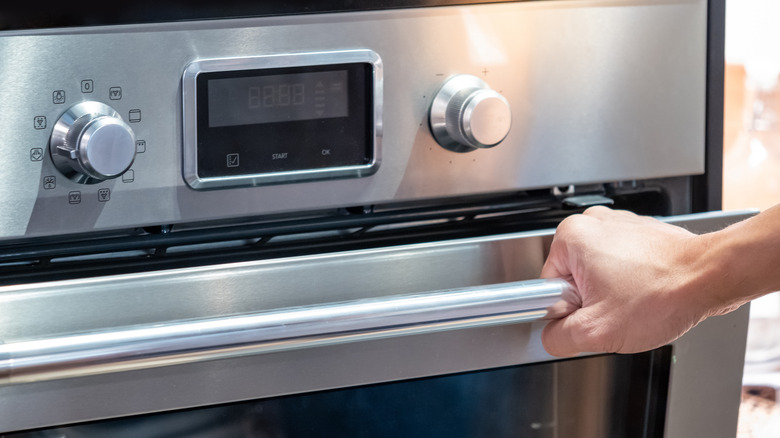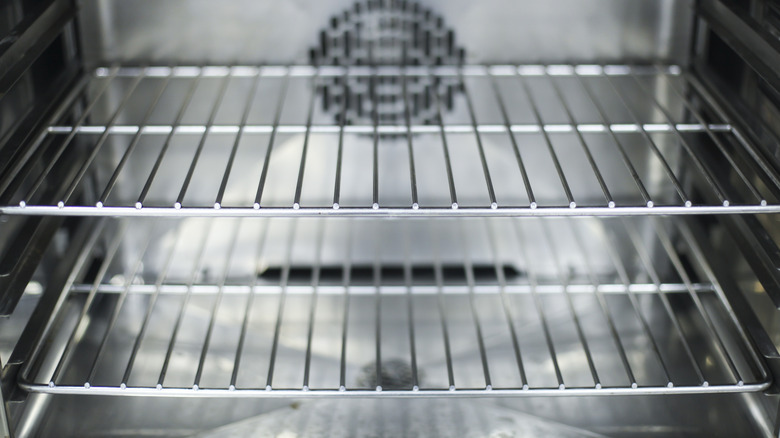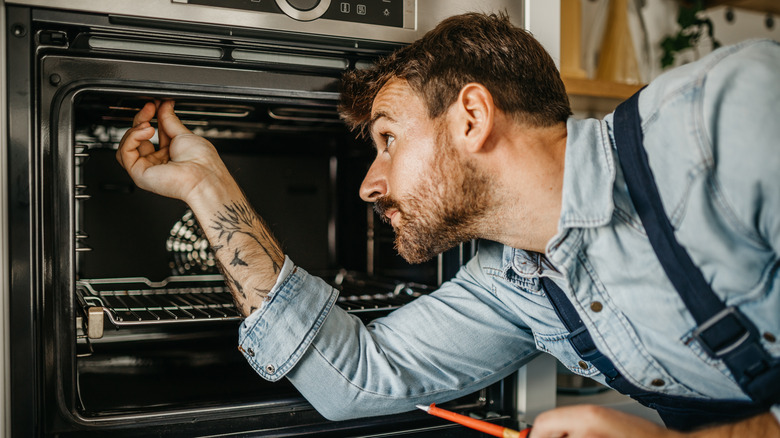If Your Oven Is Making Bizarre Noises, Here's What You Need To Do
Is your oven making strange noises you've never heard before? Whether you have a gas or electric oven, don't dismiss these unusual sounds — their abrupt appearance likely indicates that one of the oven's parts has suffered a fault. Believe it or not, an oven has several moving components that are subject to normal wear and tear as the oven gets older, as well as issues caused by grease and debris build-up. Any of these problems can force the part to produce a sound that doesn't come with normal operation.
If you're hearing noises from your oven, job one is to find out which of the components is causing them. No-brainer, right? Well, the diagnostics should be fairly simple, too, since the sounds you hear act as audible fault indicators and often hint at the defect that's behind them. Before you begin your fault-finding quest, read through the oven's user manual — the manufacturer will often specify the sound causes and explain how to fix them. However, if no such manual exists, or if it doesn't list the noise you're hearing, use the guide below as reference for fault-finding and deciding on your next steps.
Determine the root cause of the oven noise
Ovens can produce a range of audible, tell-tale distress signals when they're not feeling their best. For example, crackling or popping sounds in an electric oven are caused by electricity. In some ovens, these sounds are perfectly normal — they're the result of the heating element gaining or losing temperature. However, it's always wise to check the user manual or your manufacturer's website to confirm that sizzling or crunching noises aren't a sign of an electrical fault. If these sounds are accompanied by the smell of smoke, then they almost certainly point to an electrical malfunction with one of the oven's components.
Noises associated with motion — such as vibrating, rattling, or grinding — often mean that one of the oven's internal components isn't working properly. For instance, a distinct vibrating noise that comes on whenever the oven is in use is likely the convection fan impeller crying for help. After years of distributing heat inside the oven cavity, the impeller can come loose on its shaft and begin to vibrate. Meanwhile, the fan that cools the oven after use can make a rattling or grating noise if it's clogged with grease, burnt food, or other debris that hasn't been cleaned out of the oven. That said, clattering can also stem from the oven's constituent panels shaking whenever one of the fans switches on. This fault indicates that the panels' bolts have loosened and can't hold the panels tightly.
Troubleshoot only if you think the fix is safe — otherwise call a professional
First things first. If you have a gas oven that's making strange noises, do not attempt fixing it yourself, even if you believe that you've nailed down the cause. The tiniest of errors during troubleshooting can cause a gas leak and a possible explosion. Call a professional right away and don't use the appliance until they've come to inspect it. DIY fixes on electrical ovens can also prove risky. Even if you de-energize the oven at the circuit breaker box before troubleshooting (as you always should), a bad fix can pose a fire or electrocution hazard once the oven is turned on. To keep yourself and your family safe, request professional help if your oven's noises indicate an electrical issue.
On the other hand, loose fans and panels usually demand a simple fix that's within the realm of DIY troubleshooting. For example, a rattling sound that reveals poorly fastened panels is easy enough to silence — all you have to do is find the loose bolts and tighten them. The same fix should work for the convection impeller. Once you've disconnected the oven from its power supply, remove the front door and the panel concealing the fan blades in the oven cavity. You'll see that the impeller is fastened by a nut at its center — try tightening this bolt. If this fix doesn't eliminate the impeller's rattle, you may need to replace the unit altogether.


